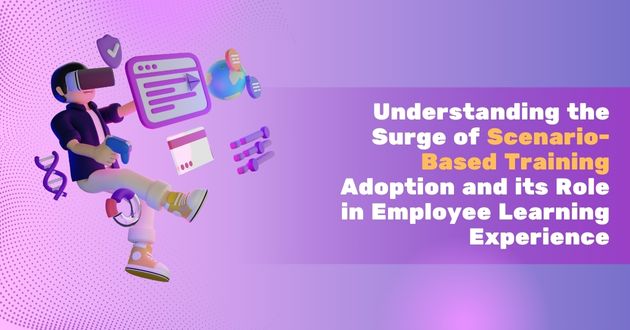Understanding the Surge of Scenario-Based Training Adoption and its Role in Employee Learning Experience

Strong 8k brings an ultra-HD IPTV experience to your living room and your pocket.
In recent years, scenario-based training has gained popularity compared to traditional lecture-style training. This type of training is more effective in terms of knowledge retention, decision-making skills, and ensuring a prepared workforce. The article tells the unique advantages of scenario-based training, its different formats, and best practices for organizations. It also highlights potential challenges that organizations may face while implementing this type of training. By adopting scenario-based training, organizations can provide their employees with a more engaging and effective learning experience.
The Advantages of Scenario-Based Training
The traditional training approaches have limitations, as passive learning leads to disengagement, and employees often fail to apply the learned material in real-life scenarios. Scenario-based training is a preferred option as it mimics real-life situations that employees may encounter daily to contrast. This type of training is more engaging and helps employees to apply the learned material to practical situations.
Here's a closer look at the key advantages that have spurred the adoption of scenario-based training:
Enhanced Engagement: Scenario-based training injects a dose of excitement and interactivity into the learning process. Employees become active participants, analyzing situations, making decisions, and experiencing the consequences of their choices. This hands-on approach keeps them hooked and fosters a sense of ownership over their learning.
Improved Knowledge Retention: Learning through application is a powerful tool for memory consolidation. By grappling with real-world scenarios, employees don't just memorize facts; they build a deeper understanding of the concepts and their practical applications. This results in knowledge that's readily available for recall when needed on the job.
Development of Critical Skills: Scenario-based training provides a safe space for employees to hone critical skills like problem-solving, critical thinking, and decision-making. As they navigate through different situations, they learn to analyze information, weigh consequences, and make informed choices – invaluable skills for any role.
Increased Confidence: Repeated exposure to simulated workplace challenges builds confidence in employees. By successfully navigating scenarios, they develop a sense of preparedness to handle similar situations in the real world.
Flexibility and Customization: Scenario-based learning can be tailored to address specific organizational needs and employee skill gaps. Scenarios can be designed to target a range of roles, from entry-level positions to leadership training.
Role in Enhancing Employee Learning Experience
The role of scenario-based learning in enhancing employee learning experiences is significant. Here's how it contributes:
Active Learning and Engagement:
Scenarios present situations employees might encounter on the job, making learning more relatable and engaging. It takes them beyond theory and into practical application.
Scenario-based learning services can involve simulations, role-playing, or branching narratives. This interactive approach keeps employees actively involved in the learning process, boosting focus and retention.
Building Skills and Confidence:
Scenarios provide a safe environment for employees to experiment with different approaches and make mistakes. It allows them to learn from these experiences without real-world consequences.
By navigating scenarios, employees hone problem-solving, critical thinking, decision-making, and communication skills in a realistic context. That prepares them to tackle similar situations in the workplace with confidence.
Improved Knowledge Retention:
Learning through scenarios creates a more memorable experience compared to passive methods. Employees actively participate and connect the information to real-world applications, leading to better knowledge retention.
Scenarios can expose areas where employees may need further training or clarification. It allows for targeted learning interventions to address specific knowledge gaps.
Contact us at https://www.acadecraft.com/contact-us/ to learn more about Acadecraft's Scenario-Based Learning Solutions.
Challenges & Solutions
While scenario-based training offers significant advantages, there are also some potential challenges to consider:
Development Cost: Creating high-quality scenarios, particularly those involving technology integration, can be resource-intensive. Careful planning and exploring cost-effective solutions are crucial.
Time Commitment: Scenario-based training can be more time-consuming than traditional methods, requiring time for development, delivery, and follow-up activities. Organizations need to make an upfront investment in time to reap the long-term benefits.
Trainer Expertise: Scenario-based trainers need strong facilitation skills and a deep understanding of the subject matter. Effective trainers can guide discussions, provide feedback, and create a safe space for learning.
Resistance to Change: Employees accustomed to traditional training methods might be resistant to a new approach. Effective communication and highlighting the benefits of scenario-based learning can help overcome this resistance.
Conclusion
This article focuses on preparing individuals to succeed in today's fast-paced work environment by enhancing engagement, improving information retention, and developing critical skills. By adopting scenario-based training, organizations can transform the learning landscape, foster a culture of continuous learning and growth, and ensure that this approach is a valued asset in their employee development plan. This can be achieved by identifying potential obstacles and incorporating best practices into the training program.
Note: IndiBlogHub features both user-submitted and editorial content. We do not verify third-party contributions. Read our Disclaimer and Privacy Policyfor details.






